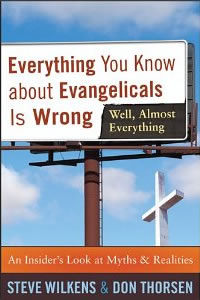Book Notes
 Steve Wilkens and Don Thorsen, Everything You Know About Evangelicals Is Wrong (Well, Almost Everything); An Insider's Look at Myths & Realities (Grand Rapids: Baker Books, 2010), 224pp.
Steve Wilkens and Don Thorsen, Everything You Know About Evangelicals Is Wrong (Well, Almost Everything); An Insider's Look at Myths & Realities (Grand Rapids: Baker Books, 2010), 224pp.
(Guest review by Ray Cowan, JwJ webmaster.)
Recently a colleague at work asked me what was the difference between evangelical and mainline Protestant churches (he is Catholic). "Evangelicals emphasize the need to hold traditional views about Jesus and the Bible," I told him confidently, "while the more liberal forms of Christianity focus on social issues." My friend looked perplexed and asked, "Social issues? You mean like going to dinners and parties?" After clarifying I had meant social justice and structural evils, I was left with a fresh reminder that, beyond a vague idea, I didn't have a decent definition of "evangelical." I thought I could give some examples of people who are evangelicals (e.g., Billy Graham or Rick Warren), but the exact concept was hard to pin down.
It turns out I'm not alone in this. Wilken's and Thorsen's new book Everything You Know About Evangelicals Is Wrong is a concise yet nuanced presentation of all things evangelical. If I had read it before the discussion with my colleague, I could have given him a better picture of evangelicalism and it's relationship to (or partial overlaps with) other ways of being Christian. For instance, even though I've been associated with evangelical churches all my life, I didn't know that the current evangelical emphasis on correct belief as the primary, if not only, real essential only goes back a hundred years or so, and has its roots in the modernist/fundamentalist struggle. See, for example, chapter 7: "Evangelicals Are Not All Calvinists." The book is not a history of evangelicalism, but it covers enough events, movements (e.g., German Pietism, British Methodism, and the American Great Awakenings) and people (e.g., George Whitefield, John Wesley) to give me new insight into where evangelicals came from and why.
For instance, I learned that in the nineteenth century and earlier, before the modernist challenges to Christian orthodoxy, evangelicals were the main players in the struggles for equality and social justice. Anti-slavery movements, equal rights for women, education for blacks, and caring for the needy in your neighborhood were as much the evangelical norm as telling people about Jesus and the Good News. Did you know that:
I find it interesting that evangelicals of that day and age found that their faith necessitated action consistent with it; the two forming a consistent whole. I also appreciate these folks' insistence on the "sanctification of sinners" (what we might call discipleship or spiritual formation today) as of equal importance to conversion."…evangelicals founded Oberlin College in 1834, the first college in America that admitted both blacks and females as full students. Its first and foremost commitment was decidedly evangelical, 'to make the conversion of sinners and the sanctification of Christians the paramount work.' However, as the outgrowth of this commitment, the college was dedicated also to the cause of abolitionism and equality." (p. 175)
The book covers many topics, many drawn from hot-button issues of today.. All the chapter titles but the first and last start with "Evangelicals Are Not All…" and end with one of "Mean, Stupid, and Dogmatic," "Waiting for the Rapture," "Anti-evolutionists," "Inerrantists," "Rich Americans," "Republicans," or "Racist, Sexist, and Homophobic," in addition to the "Calvinists" chapter. The account of the growth of evangelicalism in third world (the "Two-thirds World") is fascinating and heartening, as is the discussion of the role of Christians in politics and civil life. For instance, in the "Republicans" chapter (written by Wilkens who, in the interest of full disclosure, tells us upfront that he is a "broken-glass Republican"), they note that "…those who seek first the Kingdom of God must remain captive to God's aims or their goals will be hijacked by those govening earthly kingdoms."
Everything You Know About Evangelicals Is Wrong is a thoughtful book and I'm glad I had the opportunity to study it. And I think it would be a good thing if my evangelical friends knew more about the history of, and the issues facing, evangelicalism today. A good start would be to read this book.


